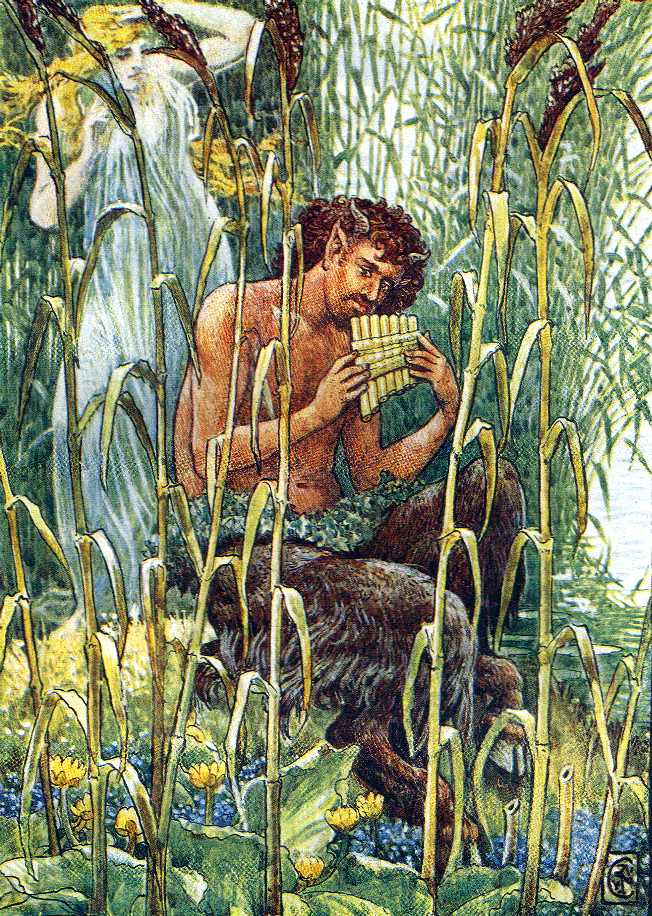Story of Greece - Mary Macgregor |
The Great God Pan
The supreme god of the Hellenes was Zeus. He dwelt in the sky, yet on earth, too, he had a sanctuary amid the oak-woods of Dodona.
When the oak-leaves stirred, his voice was heard, mysterious as the voice of the mightiest of all the gods.
In days long after these, Phidias, a great Greek sculptor, made an image of Zeus. The form and the face of the god he moulded into wondrous beauty, so that men gazing saw sunshine on the brow, and in the eyes gladness and warmth as of summer skies.
Even so, if you watch, you may catch on the faces of those whose home is on the hill-side, or by the sea, a glimpse of the beauty and the wonder amid which they dwell.
It was only in very early times that the chief sanctuary of Zeus was at Dodona. Before they had dwelt long in Hellas, the Hellenes built a great temple in the plain of Olympia to their supreme god and named it the Olympian temple.
Here a gold and ivory statue of the god was placed, and to the quiet courts of the temple came the people, singing hymns and marching in joyous procession.
Zeus had stolen his great power from his father Kronus, with the help of his brothers and sisters. To reward them for their aid the god gave to them provinces over which they ruled in his name. Hera, Zeus chose as queen to reign with him. To Poseidon was given the sea, and a palace beneath the waves of the ocean, adorned with seaweed and with shells.
Pluto was made the guardian of Hades, that dark and gloomy kingdom of the dead, beneath the earth, while Demeter was goddess of the earth, and her gifts were flowers, fruits, and bounteous harvests.
Athene was the goddess of war and wisdom, yet often she was to be seen weaving or embroidering, while by her table sat her favourite bird, an owl.
Hermes was known as the fleet-footed, for on his feet he wore winged sandals to speed him swiftly on the errands of the gods.
Apollo, the Sun-god, was the youngest of all the Olympian deities. He dwelt at Parnassus on the eastern coast of Greece, and his sanctuary was at Delphi.
The fairest of the goddesses was Aphrodite, Queen of Love. Her little son was named Eros, and he never grew up. Always he was a little rosy, dimpled child, carrying in his hands a bow and arrows.
Many more gods and goddesses were there in the wonder days of long ago, but of only one more may I stay to tell you now.
The great god Pan, protector of the shepherds and their flocks, was half man, half goat. Everyone loved this strange god, who yet ofttimes startled mortals by his wild and wilful ways. When to-day a sudden, needless fear overtakes a crowd, and we say a panic has fallen upon it, we are using a word which we learned from the name of this old pagan god.
Down by the streams the great god Pan was sometimes seen to wander—
|
"What was he doing, the great god Pan, Down in the reeds by the river? Spreading ruin and scattering ban, Splashing and paddling with hoofs of a goat, And the breaking the golden lilies afloat, With the dragon-fly on the river. "He tore out a reed, the great god Pan, From the deep cool bank of the river," |
and then sitting down he 'hacked and hewed, as a great god can,' at the slender reed. He made it hollow, and notched out holes, and lo! there was a flute ready for his use.
 Sweet, piercing sweet was the music of Pan's pipe |
Sweet, piercing sweet was the music of Pan's pipe as the god placed his mouth upon the holes.
|
"Blinding sweet, O great god Pan! The sun on the hill forgot to die, And the lilies revived, and the dragon-fly Came back to dream on the river." |
On the hill-sides and in the fields of Hellas, the shepherds heard the music of their god and were merry, knowing that he was on his way to frolic to dance among them.
Pan lived for many, many a long year; but there is a story which tells how on the first glad Christmas eve, when Jesus was born in Bethlehem, a traveller, as he passed Tarentum, the chief Greek city in Italy, heard a voice crying, 'The great god Pan is dead.'
And when this same Jesus had grown to be a Man, and 'hung for love's sake on a Cross,' one of our own women poets sings that all the old gods of Greece
|
"fell down moaning, Each from off his golden seat; All the false gods with a cry, Rendered up their deity, Pan, Pan was dead." |
And the reason that the old gods fell was that the strange Man upon the Cross was mightier than they. But in the days of ancient Greece the gods were alive and strong; of that the Hellenes were very sure.